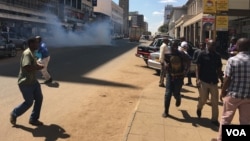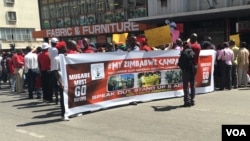Media protection groups are calling on the international community to pressure President Robert Mugabe's government to respect freedom of the press in Zimbabwe.
Photojournalist James Jemwa was released on bail Friday after spending a week behind bars, but the Media Institute of Southern Africa said two other journalists were still in custody and several others had been assaulted or had their equipment destroyed by police while covering anti-government protests.
“Media in Zimbabwe should enjoy their freedom as granted by the constitution and not at the benevolence of state agencies," said Nhlanhla Ngwenya, head of the institute in Zimbabwe. "We are seeking to engage commanders of these people who have been arresting and wantonly beating up journalists and actually express our anger and let them know that journalism is not a crime. So the fact that they are found at these protests, it is not because they like it there, but it is because they are answering to their call of duty, as much as the police do so.”
On Thursday, the Zimbabwe Union of Journalists said it wanted international bodies such as the United Nations and the Committee to Protect Journalists to plead with the Mugabe government to respect freedom of the press, which has been guaranteed in the constitution since 2013.
Wave of demonstrations
For the past two months, Zimbabwe has been hit by an unprecedented wave of anti-Mugabe protests accusing the 92-year-old leader of failing to fix the country's economy and respect human rights. It is during those protests that photojournalists have been assaulted, arrested or had equipment destroyed by police.
In a telephone interview Friday, Zimbabwe Information Minister Christopher Mushohwe maintained his earlier stance, in which he blamed journalists for the assaults from the police.
"Journalists should never, ever be part of a demonstrating mob," he said. "You should always be on the side of law enforcement agents. And that is what is done internationally." If protesters resort to violence, he added, journalists' job "is to take pictures and not to be part of them."
Mushohwe repeated his position despite the fact that video and photos have been circulating on social media showing police assaulting or chasing journalists and, in some instances, asking them to delete their work.





